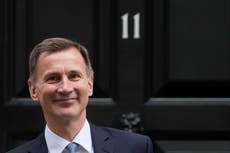What tax cuts can we expect, and will they make it harder for Labour?
Next year won’t feel like a boom, tax cuts or not, says Sean O’Grady


Jeremy Hunt and Rishi Sunak have been dropping hints about tax cuts in Wednesday’s autumn statement, and it also seems that there will be some benefits reforms to get people back into the labour market. It’s a sharp change in mood compared to even a few months ago, and ministers hope it may signal a political as well as an economic turning point.
What has changed?
As recently as September, the chancellor warned it would be “virtually impossible” to make tax cuts in the autumn statement. Back then, inflation was still looking a little “sticky”, and thus it was a little more likely that the Bank of England might have to push interest rates even higher. With Britain’s national debt now about the same as the value of the national income over a whole year, higher rates would have further increased the debt interest, leaving less room for tax cuts or spending increases.
But since then, things have been going more the government’s way. Inflation has fallen back towards Mr Sunak’s target of around 5 per cent (albeit way higher than the actual official government and Bank of England target of 2 per cent). The size of the economy and the rate of growth are also better than expected, which makes debt and the annual deficit smaller in relation. More than anything, the decision to ramp up taxes last year has produced healthier receipts.
How much healthier?
According to the Office for Budget Responsibility, the government is roughly £20bn “better off” than previously estimated. This is the so-called headroom the chancellor has to play with. A cut in the basic rate of income tax of 1p in the pound would cost around £5bn, for example.
So when will we get the tax cuts?
If announced in Wednesday’s autumn statement, they would probably be effective from April – a feelgood bonus in an election year. Mr Sunak says the time for tax cuts is now, because of the economic progress made, particularly on inflation: “That’s why we can now can move on to the next phase of our economic plan and turn our attention to cutting taxes. We will do so seriously, we will do so responsibly, but that time is now here."
There may be more in the spring Budget too.
What will they be?
After yet another burst of intense speculation about inheritance tax, it seems that won’t be touched after all. The current indications are more help for businesses through “full expensing” – generous tax breaks for investing in capital equipment in order to raise growth, productivity and, in due course, wages. A reduction in national insurance could also be on the cards; as a tax paid only by those in work, it fits the narrative about making work pay and filling the nearly one million vacancies in the economy.
Less happily, there may be a bigger rise in council tax bills; and possible reductions in benefits for those who are, in the government’s view, not doing enough to find work.
Whose budget is it?
With some rare good news in prospect, Mr Sunak seems very keen to have his name associated with this autumn statement. Though they are in broad agreement, it may be that Mr Hunt and the Treasury are more cautious about relaxing fiscal policy, reflecting the usual institutional bias.
What about tax thresholds?
There’s the rub. One big reason why tax receipts are so healthy is because tax thresholds for the lower and higher rates of tax have been frozen since 2021, and are scheduled to remain so until the 2026-27 tax year. But as inflation pushes up wages, more workers drift into higher tax brackets – so-called “fiscal drag”. It’s a very strong stealth tax. Any cuts in income tax or national insurance have to be put in this context: taking a lot through frozen thresholds and higher council tax, but giving back a little through lower rates.
What could go wrong?
Plenty. A sum like £20bn is a lot of headroom for the chancellor, but in fact it represents the difference between two far larger sums of money: total tax receipts, and total spending. Thus, borrowing in the first six months of 2023/24 totalled £81.7 billion – £15.3 billion more than the same period last year, but £19.8 billion below the monthly profile consistent with the March forecast by the OBR. Even the smallest slip in growth or government spending could wipe out the chancellor’s room for manoeuvre. The Institute for Fiscal Studies advises no unfunded tax cuts, saying: “We live in a demonstrably risky political and economic environment which could require a big spike in borrowing at any moment.”
Leading indicators and disappointing retail sales suggest the economy remains close to the edge of recession. Next year won’t feel like a boom, tax cuts or not.
What could go right?
Growth could be unexpectedly good. The situation in Gaza and Ukraine might ease enough to keep energy prices more stable. In such circumstances, the spring Budget could see more tax deductions, real and promised. But big surprises to the upside seem unlikely.
And politically?
Ministers might benefit from drawing a line between their party and Labour. Mr Sunak and Mr Hunt will be asking Keir Starmer and Rachel Reeves if they would reverse the tax cuts, however modest. Labour will also be challenged on the cuts to benefits to “encourage” people into work. The reality is that, apart from the Labour green new deal, the fiscal plans of both main parties are closely aligned – the result of an essentially stagnant economy with some endemic inflationary tendencies.
Will tax cuts calm the Tory party?
They always do. Action now takes some of the backbench pressure off Mr Sunak, vindicates the policy he and Mr Hunt have followed and gives them more opportunities to criticise last year’s Truss-Kwarteng mini-Budget.
Join our commenting forum
Join thought-provoking conversations, follow other Independent readers and see their replies
Comments


Bookmark popover
Removed from bookmarks